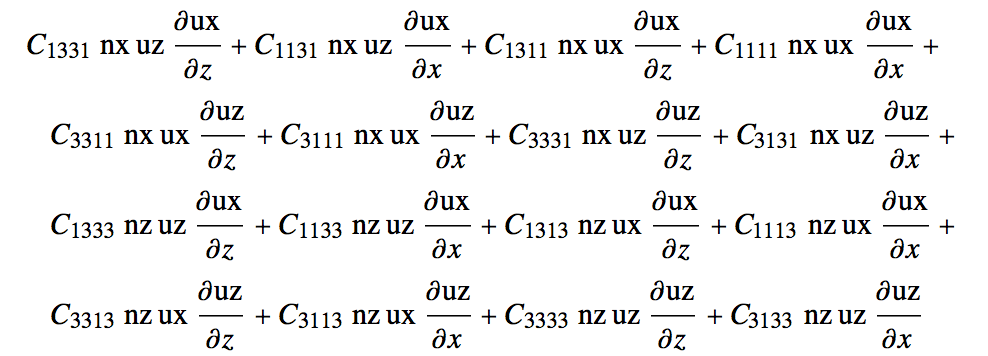I am quite new in Mathematica (1 week new) and after many trials I did not manage to make my partial derivatives to look traditional way.
There are few topics such as How to make traditional output for derivatives and Customizing display of partial differential equations answering this question, but in my case all proposed methods does not give desirable result.
Want this: $\frac{\partial u_x}{\partial x} + \frac{\partial u_x}{\partial z} + \frac{\partial u_z}{\partial x} + \frac{\partial u_z}{\partial z}$
Have this: $u_x^{(0,0,1)}(x,0,z) + ...$ or $\frac{\partial uv[[1]]} {\partial xz[[1]]}+...$
I would like to expand equation $n_l u_k C_{ijkl} u_{i,j}$. For this purpose I am doing sum over all 4 $ijkl$ indices and result looks as I want but partial derivatives
Code that I am using:
nv = {nx, 0, nz}; uv = {ux[x, 0, z], 0, uz[x, 0, z]}; xz = {x, 0, z}; CC = Array[C_{ToExpression@StringJoin@IntegerString@ {#1, #2, #3, #4}} &, {3, 3, 3, 3}]; (* _{ToExpression@StringJoin@IntegerString@ {#1, #2, #3, #4}} stands for a subscript of C *) ux /: Format[ux[___]] := ux; uz /: Format[uz[___]] := uz; TraditionalForm[Sum[Part[nv, l] Part[uv, k] Part[CC, i, j, k, l] D[Part[uv, i], Part[xz, j]], {i, {1, 3}}, {j, {1, 3}}, {k, {1, 3}}, {l, {1, 3}}]] If you have any ideas I am grateful in advance
Thanks!

